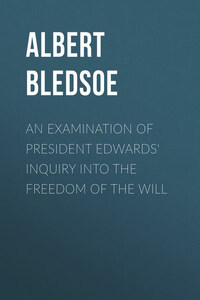I entered upon an examination of the “Inquiry” of President Edwards, not with a view to find any fallacy therein, but simply with a desire to ascertain the truth for myself. If I have come to the conclusion, that the whole scheme of moral necessity which Edwards has laboured to establish, is founded in error and delusion; this has not been because I came to the examination of his work with any preconceived opinion. In coming to this conclusion I have disputed every inch of the ground with myself, as firmly and as resolutely as I could have done with an adversary. The result has been, that the views which I now entertain, in regard to the philosophy of the will, are widely different from those usually held by the opponents of moral necessity, as well as from those which are maintained by its advocates.
The formation of these views, whether they be correct or not, has been no light task. Long have I struggled under the stupendous difficulties of the subject. Long has darkness, a deep and perplexing darkness, seemed to rest upon it. Faint glimmerings of light have alternately appeared and disappeared. Some of these have returned at intervals, while others have vanished for ever. Some have returned, and become less wavering, and led on the mind to other regions of mingled obscurity and light. Gladly and joyfully have I followed. By patient thought, and sustained attention, these faint glimmerings have, in more instances than one, been made to open out into what has appeared to be the clear and steady light of truth. If these are not mere fond illusions, the true intellectual system of the world is far different from that which has been constructed by the logic of President Edwards.
If his system be false, why, it may be asked, has the Inquiry so often appeared to be unanswerable? Why has it been supposed, even by some of the advocates of free agency, that logic is in favour of his system, while consciousness only is in favour of ours? One reason of this opinion is, that it has been taken for granted, that either the scheme of President Edwards or that of his opponents must be true; and hence, his system has appeared to stand upon immoveable ground, in so far logic is concerned, only because he has, with such irresistible power and skill, demolished and trampled into ruins that of his adversaries. Reason has been supposed to be on his side, because he has so clearly shown that it is not on the side of his opponents. But the scheme of the motive-determining power, does not necessarily arise out of the ruins of the self-determining power; it is only to the imagination that it appears to do so. Because the one system is false, it does not follow that the other is true.
There is another and still more powerful reason for the idea in question. The advocates of free agency have granted too much. The great foundation principles of the scheme of moral necessity have been incautiously admitted by its adversaries. These principles have appeared so obvious at first view, that their correctness has not been doubted; and hence they have been assumed by the one side and conceded by the other. Yet, if I am not greatly mistaken, they have been derived, not from the true oracles of nature, but from what Bacon quaintly calls the “idols of the tribe.” If this be the case, as I think it will hereafter appear to be; then in order to secure a complete triumph over the scheme of moral necessity, even on the arena of logic, we must not only know how to reason, but also how to doubt.
I fully concur with the younger Edwards, that “Clarke, Johnson, Price, and Reid have granted too much;” and while I try to show this, I shall also endeavour to show that President Edwards has assumed too much, not for the good of the cause in which he is engaged, but for the attainment of truth.
If his system had not been founded upon certain natural illusions, by which the true secrets of nature are concealed from our view, it could never have been the boast of its admirers, “that a reluctant world has been constrained to bow in homage to its truth.” If we would try the strength of this system then, we must bend a searching and scrutinizing eye upon the premises and assumptions upon which it is based; we must put aside every preconceived notion, even the most plausible and commonly received opinions, and lay our minds open to the steady and unbiased contemplation of nature, just as it has been created by the Almighty Architect; we must view the intellectual system of the world, not as it is seen through our hasty and careless conceptions, but as it is revealed to us in the light of consciousness and severe meditation. This will be no light task, I am aware; but whosoever would seek the truth on such a subject, must not expect to find it by light and trifling efforts; he must go after it in all the loving energy of his soul. Let this course be pursued, honestly and perseveringly pursued, and I am persuaded, that a system of truth will be revealed to the mind, to which it will not be constrained to render “a reluctant homage,” but which, by harmonizing the deductions of logic with the dictates of nature, will secure to itself the most pleasing and delightful homage of which the human mind is susceptible.








